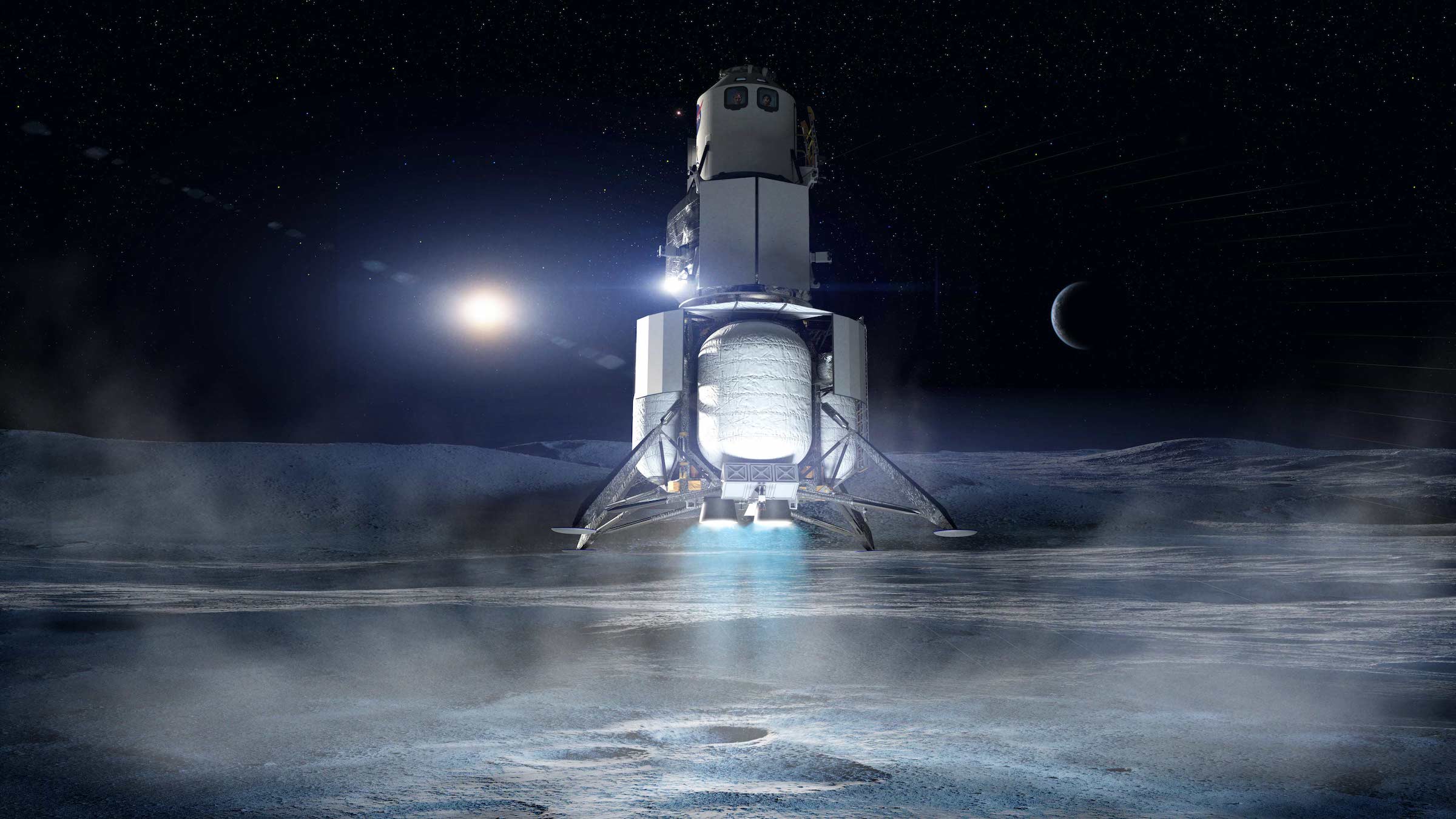Blue Origin and Dynetics are still steaming over NASA’s decision to award only one contract — to SpaceX — to build a Human Landing System for the Artemis program. Their protest of the decision was recently rejected, and now the Government Accountability Office’s arguments, which Blue Origin publicly questioned, are available for all to read. Here are a few highlights from the point-by-point takedown of the losing companies’ complaints.
In case you can’t quite remember (2020 was a long year), NASA originally selected the three companies mentioned for early funding to conceptualize and propose a lunar landing system that could put boots on the moon in 2024. They suggested the next step would be, if possible, to pick two proposals to move forward with. But when the time for awards rolled around, only SpaceX walked away with a contract.
Dynetics and Blue Origin protested the decision separately, but on similar grounds: First, NASA should have awarded two companies as promised, and not doing so is risky and anti-competition. Second, it should have adjusted the terms of the award process when it learned it didn’t have much budget to set aside for it. Third, NASA didn’t evaluate the proposals fairly, showing a bias to SpaceX and against the others in various ways.
The GAO puts all of these concerns to bed in its report — and in the process makes Blue Origin’s follow-up complaint, that the agency’s “limited jurisdiction” meant it couldn’t adequately address the protests, look like the sour grapes it is.
One and done

As to awarding one rather than two companies a contract, the answer is right there in black and white. The announcement clearly stated multiple times that the whole thing was contingent on having enough money in the first place. NASA may have preferred, hoped, even expected to award two contracts, but it was very clear that it would be awarding “up to two” or “one or more” of them. After all, what if only one met the requirements and the others didn’t? Would NASA be obligated to throw money at an unsuitable applicant? No, and that’s more or less what happened.
From the report:
Even where a solicitation contains an intention to make multiple awards, we have recognized that an agency is not required to do so if the outcome of proposal evaluation dictates that only one contract should be awarded. For example, regardless of an agency’s intention, it cannot, in making contract awards, exceed the funds available.
The GAO explains that the decision-making process at NASA weighted the technical approach the highest, then price, then management (i.e. organization, scheduling, etc.). Each company’s proposal was evaluated independently on each of these characteristics, and the final results were compared. Here’s a top-level summary of the ratings assigned:

And the report again:
The technical approach factor was to be more important than the total evaluated price factor, which in turn was to be more important than the management approach factor; the non-price factors, when combined, were significantly more important than price.
…Contrary to the protesters’ arguments, even assuming a comparative analysis was required, SpaceX’s proposal appeared to be the highest-rated under each of the three enumerated evaluation criteria as well as the lowest priced.
When the budget for NASA was finalized, it left less for the HLS program than expected, and the agency was forced to make some tough choices. Luckily they had a proposal that was as good or better than the others technically (the most important factor), considerably better than the others organizationally and came in at a very reasonable cost. It was a clear choice to award a contract to SpaceX.
But having done so, NASA found that the cupboard was bare. Even so, Blue Origin argued that it deserved to be contacted about somehow making it work. Perhaps, they suggested, if NASA had come to them to negotiate, they could have put together a proposal that might have looked even better than SpaceX’s. (Jeff Bezos’s brazen after-the-fact $2 billion offer suggests they had some wiggle room.)
Bezos offers billions in incentives for NASA’s lunar lander contract
NASA, however, had already concluded otherwise, as the GAO confirms:
…The agency concluded that it was not “insurmountable” to negotiate with SpaceX to shift approximately $[DELETED] in FY2021 proposed milestone payments (or approximately [DELETED] percent of the $2.941 billion total proposed price) to later years to meet NASA’s FY2021 funding limitations. In contrast, the SSA concluded that it was implausible for Blue Origin ($5.995 billion) and Dynetics ($9.082 billion) to materially reduce their significantly higher total proposed prices without material revisions to their respective technical and management approaches…
Redactions notwithstanding, it’s not difficult to see the issue here. While it was conceivable, even reasonable, for SpaceX to shift a few hundred million or so around to make the fiscal math work, already questionable at the $3 billion mark, it was not conceivable that Blue Origin or Dynetics could shave half or more off their costs to make those same fiscal milestones happen.
As NASA’s selection group explained at the time:
After accounting for a contract award to SpaceX, the amount of remaining available funding is so insubstantial that, in my opinion, NASA cannot reasonably ask Blue Origin to lower its price for the scope of work it has proposed to a figure that would potentially enable NASA to afford making a contract award to Blue Origin.
Blue Origin complained that NASA should have warned them that the budget might lead to restrictions in the selection process, but the GAO simply notes that not only is the federal budget hardly secret, but that the companies waited until after the award was made to raise an issue. Such complaints need to be timely in order to be taken seriously, it wrote, and furthermore there is nothing in the complaints that suggests that even had NASA warned them, anything would have turned out differently.
US government watchdog rejects Blue Origin’s protest over lunar lander contract
There is also the question of whether choosing a single provider is “anticompetitive and unduly risky,” as the protests put it. While the GAO admits that “these important questions of policy may merit further public debate,” the complaint is moot since NASA didn’t have the money to do more than one in the first place. As voters and advocates of a generous budget for space exploration, we may say it’s a shame that NASA didn’t have $6 billion more to play with, but that doesn’t mean the agency’s decision to put the money it had to the best purpose possible was incorrect.
In space, no one can hear you cry

Blue Origin and Dynetics alleged that the process was biased in favor of SpaceX in that the various companies were unfairly evaluated for strengths and weaknesses. But the GAO sees these complaints for the fluff that they are.
In one case, Blue Origin complains that the announcement did not specifically require the vehicles to be able to land in the dark. Well, first of all, it does, and second of all, space is dark. If your design doesn’t take that into account, you’re gonna have a bad time out there.
In another instance, the communications systems proposed by Blue Origin and SpaceX both were flagged for not meeting certain requirements — but Blue Origin got a “significant weakness” listed for its system and SpaceX only got a “weakness.” Evidence of preferential treatment, they suggest.
Not so much, says the GAO: “Even a cursory review of the evaluation record demonstrates material differences between the proposals that support NASA’s different evaluation findings.” In this case four of Blue Origin’s communications links didn’t work as required, and a fifth was a maybe. SpaceX only had two not work right. This sort of substantial difference appeared in each of the objections cited by the complainants.
In fact, the report goes on to say:
We note that Blue Origin fails to rebut any of the analysis presented by the contracting officer with respect to Blue Origin’s or SpaceX’s proposals. In fact, Blue Origin initially challenged the agency’s evaluation of its own proposal, but then affirmatively withdrew that protest ground after receipt of the agency report.
Blue Origin groused that SpaceX got extra points for a design that focused on the crew’s safety, health and comfort, despite many of the design choices not being explicitly required. The GAO says NASA is well within its discretion as an expert agency to consider these as meritorious — in fact, they call it a “representative example of why discretion is due” in such cases — and really, if you’re objecting on the grounds that the competition’s capsule was too nice, it may be advisable to reconsider your priorities.

Even had several of the decisions been successfully challenged, it wouldn’t have changed the outcome, the report explains.
SpaceX received the following evaluation totals:
- Technical: 3 significant strengths; 10 strengths; 6 weaknesses; and 1 significant weakness
- Management: 2 significant strengths; 3 strengths; and 2 weaknesses
While Blue Origin received the following:
- Technical: 13 strengths; 14 weaknesses; and 2 significant weaknesses
- Management: 1 significant strength; 2 strengths; and 6 weaknesses
It’s never a pleasant occasion to find one has been thoroughly beaten on practically every factor that counts, but that really seems to be the factor here. Dynetics and its complaint meet the same fate, by the way, but with a bit more rough treatment.
…Even allowing for the possibility that the protesters could prevail on some small subset of their challenges to NASA’s evaluation, the record reflects that NASA’s evaluation was largely reasonable, and the relative competitive standing of the offerors under the non-price factors would not materially change…
The protests are denied.
It’s a pretty brutal documentation of the shortcomings of Blue Origin and Dynetics, and one that would not have been necessary had the companies taken their lumps and accepted that NASA isn’t out to get them. They lost fair and square, and now they look like whiny also-rans instead of ambitious could-bes.































Comment